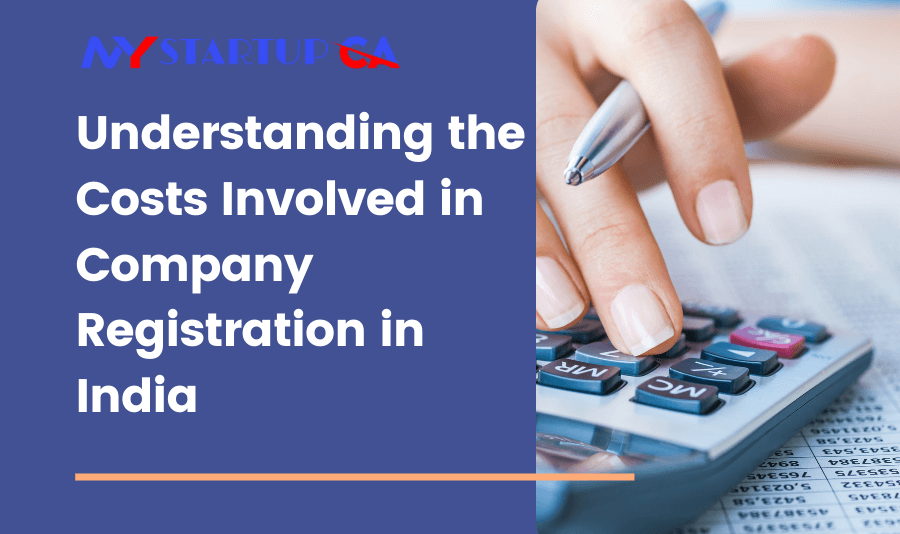
Learn about the various costs involved in registering a company in India, including fees for Digital Signature Certificates (DSC), Director Identification Numbers (DIN), name reservation, stamp duty, incorporation, professional services, and more. Plan your budget effectively for a smooth registration process.
MyStartupCA
Registering a company in India is a vital step for establishing a legitimate business. While the process may seem straightforward, it’s essential to understand the costs involved to budget effectively and avoid unexpected expenses. This guide breaks down the various costs associated with company registration in India, helping you make informed financial decisions.
1. Digital Signature Certificate (DSC)
A Digital Signature Certificate (DSC) is required for signing electronic documents during the company registration process. Each director and authorized signatory must obtain a DSC. The cost of obtaining a DSC ranges from INR 800 to INR 1,500, depending on the certifying authority and the validity period, which can be one or two years.
2. Director Identification Number (DIN)
A Director Identification Number (DIN) is mandatory for all directors of a company. The cost for applying for a DIN is typically INR 500 per director. This one-time fee covers the application and issuance of the DIN, which remains valid for the lifetime of the director.
3. Name Reservation
Choosing a unique name for your company and reserving it with the Ministry of Corporate Affairs (MCA) involves a fee. The cost for filing the RUN (Reserve Unique Name) form is INR 1,000. This fee covers the submission and review of the proposed name. If the name is rejected, you will need to reapply, incurring additional costs.
4. Stamp Duty
Stamp duty is payable on the incorporation documents, including the Memorandum of Association (MoA) and Articles of Association (AoA). The amount of stamp duty varies by state and the authorized share capital of the company. On average, the stamp duty can range from INR 500 to INR 1,000 for a company with a minimal authorized capital. Higher authorized capital amounts will incur higher stamp duty fees.
5. Incorporation Fees
The MCA charges fees for incorporating a company through the SPICe+ (Simplified Proforma for Incorporating a Company Electronically Plus) form. The fees depend on the authorized share capital of the company. For instance:
- Up to INR 1,00,000: INR 2,000
- INR 1,00,001 to INR 5,00,000: INR 3,000
- INR 5,00,001 to INR 10,00,000: INR 4,000
Companies with higher authorized capital will have proportionately higher incorporation fees.
6. Professional Fees
While it’s possible to handle the registration process independently, many entrepreneurs prefer to hire professionals like chartered accountants, company secretaries, or legal advisors to ensure compliance and accuracy. Professional fees can vary widely based on the complexity of the registration and the reputation of the service provider. On average, professional fees can range from INR 5,000 to INR 20,000.
7. Miscellaneous Costs
Additional costs may include obtaining a company seal (if required), notarizing documents, and any incidental expenses related to preparing and submitting forms. These miscellaneous costs can add up to approximately INR 1,000 to INR 2,000.
8. Post-Incorporation Costs
After the company is registered, there are additional costs to consider, such as:
- PAN and TAN: The application fee for a Permanent Account Number (PAN) and Tax Deduction and Collection Account Number (TAN) is around INR 150 each.
- GST Registration: If applicable, GST registration is free, but you may incur professional fees for assistance.
- Bank Account Opening: While there is no direct fee for opening a bank account, some banks may require an initial deposit.
Understanding the costs involved in company registration in India is crucial for effective financial planning. From DSC and DIN fees to stamp duty and professional charges, each expense plays a significant role in the overall budget. By being aware of these costs, you can better prepare for the financial requirements of starting your business, ensuring a smooth and hassle-free registration process. Proper budgeting and planning will allow you to focus on growing your business without unexpected financial strain.

